REGIONAL RECYCLING INFRASTRUCTURE STUDY: Northwestern Indiana in Focus
NAVIGATE TO FULL PROJECT SITE HERE
EXECUTIVE SUMMARY
In 2019, the Indiana Recycling Coalition partnered with Purdue University Environmental and Ecological Engineering Program to produce an in-depth study of the recycling infrastructure of a 10-county region in Northwest Indiana. This work was funded by a grant from the Wabash Heartland Innovation Network Regional Cultivation Fund. The study zeros in on residential recycling activities via remote recycling drop offs, curbside collection programs, and public and private recycling centers in the region.
Over the course of 10 months, the Indiana Recycling Coalition (IRC) engaged with the Indiana Department of Environmental Management (IDEM), six (6) solid waste management districts (SWMDs), 18 municipalities, six (6) private recycling centers, multiple materials recovery facilities, and public and private haulers to better understand the regional recycling infrastructure. Topics studied included education efforts, contamination, access, material flow, programmatic challenges, and investment opportunities. Using available and collected data, the team
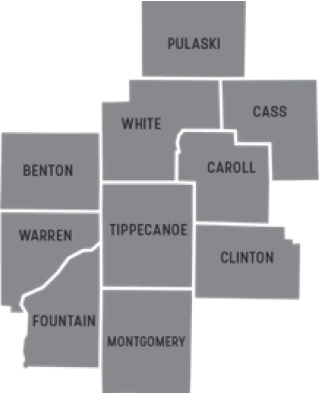 conducted an in-depth analysis and presented multiple key findings for each theme which helped informed the compilation of regional recommendations. A small sample of key findings follows. Recycling access coverage was found to be higher (at 87%) than other regions in Indiana and recycling rates about on par with the national average. The most commonly cited regional contaminant is food residue. SWMDs perform higher on average than municipalities in their education efforts. The majority of recovered materials from residential recycling leave the 10-county region and travel over 100 miles to reach secondary processors, often their third destination. The single greatest challenge is funding and the greatest investment areas are better equipment and increased processing capacity.
conducted an in-depth analysis and presented multiple key findings for each theme which helped informed the compilation of regional recommendations. A small sample of key findings follows. Recycling access coverage was found to be higher (at 87%) than other regions in Indiana and recycling rates about on par with the national average. The most commonly cited regional contaminant is food residue. SWMDs perform higher on average than municipalities in their education efforts. The majority of recovered materials from residential recycling leave the 10-county region and travel over 100 miles to reach secondary processors, often their third destination. The single greatest challenge is funding and the greatest investment areas are better equipment and increased processing capacity.
Over 45 region-specific recommendations are provided in detail as well as a second short list of the top 13 recommendations that arose from a prioritization process. The IRC is optimistic that the analysis and resultant recommendations will spark conversations which lead to informed, forward-thinking solutions for the region that leverage local talent, build upon intimate knowledge held by regional recycling stakeholders, renew program vitality, and increase a sense of connectedness and regionalism within Northwest Indiana’s recycling system.
The project was an enlightening process, both from collaborating with partners to develop methods of data collection and from analyzing and understanding the results of that data. The IRC is excited about the recommendations within this report and the ways in which this effort will continue to impact future studies and investments in Indiana’s recycling industry and the greater circular economy. The team hopes that the investment ideas proposed within the report garner the interest of local, state and national funders like the WHIN Regional Cultivation Fund, IDEM’s Recycling Market Development Grant Program, The Recycling Partnership, and others.
Project Deliverables
- Project Website
- Full Regional Recycling Infrastructure Study Report
- Prioritized List of 45 Recommendations
- Short list of Top 13 Recommendations
- Interactive Infrastructure Map
- Recovered Material Flow Maps
- Recommendations and Resources for IDEM’s 2020 Statewide Infrastructure Study
- Exploratory Educational Matrix to measure entity’s educational efforts
- Survey Templates for IN SWMDs and Municipalities
PROJECT FUNDERWabash Heartland Innovation Network: SMART TECHNOLOGY. SMART REGION. SMART FUTURE.The Wabash Heartland Innovation Network (WHIN) is a consortium of 10 counties in north-central Indiana devoted to working together to fuel prosperity by harnessing the power of Internet-enabled sensors to develop our region into a global epicenter of digital agricultural and next-generation manufacturing. WHIN is merging the Midwest’s unparalleled leadership in agriculture and manufacturing with Purdue University’s globally recognized engineering expertise and Ivy Tech’s applied education. We are building upon all of our world-class abilities - agriculture, manufacturing and engineering - while focusing on our region’s sense of community and affordable cost of living. whin.org |
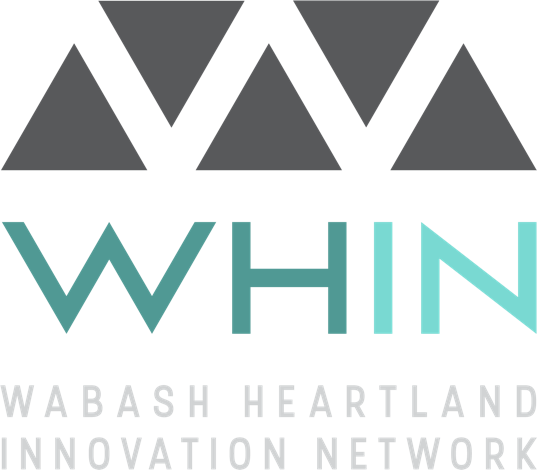 |
PROJECT PARTNERPurdue University“Creating sustainable systems that can exist in harmony with the natural world” The research of Purdue University’s Environmental and Ecological Engineering program embraces issues related to legacy, existing, and potential environmental challenges or opportunities. The EEE discovery mission is positioned to respond to society’s need to understand the world we live in, and to develop strategies for sustainably managing Earth’s limited resources and ecosystems so that they will be available for generations to come. engineering.purdue.edu |
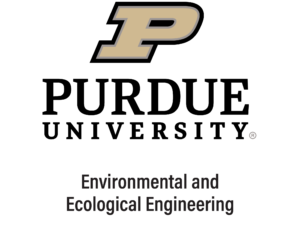 |
PROJECT COLLABORATORSThe Recycling PartnershipThe Recycling Partnership (TRP), a national nonprofit transforming recycling for good in towns, cities and states all across America, served in an advisory capacity. TRP is a grant-making and loaning organization that consolidates expertise from across the country including best practices for municipal, regional and state residential recycling programs. |
 |
Indiana Department of Environmental ManagementIndiana’s state environmental regulatory agency, IDEM, contributed historic, annual, recycling data by material type, origin and final destination for the region. IDEM also offered feedback and guidance on project direction. |
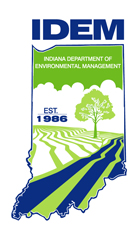 |
Solid Waste Management DistrictsMultiple solid waste management district directors for the ten-county region were engaged to help the IRC understand the recycling landscape of the region, share challenges and opportunities as well as county level recycling data, and provide feedback on possible technological solutions. |
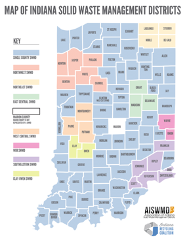 |
Municipal Street & Sanitation DepartmentsAll cities and towns within the ten-county region who currently offered curbside recycling programs and/or operated their own recycling drop-offs were engaged to help the IRC understand the nature of their programs, the challenges and opportunities they faced, and provide municipal recycling data. |
|
Private Recycling CompaniesA handful of private entities operating private recycling facilities, MRFs, transfer stations, and hauling services were engaged to fill in data gaps where applicable, reinforce information, and share their perspective as business owners – small and large. |
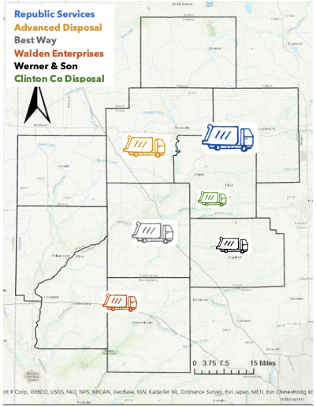 |
last updated: June 2, 2020

